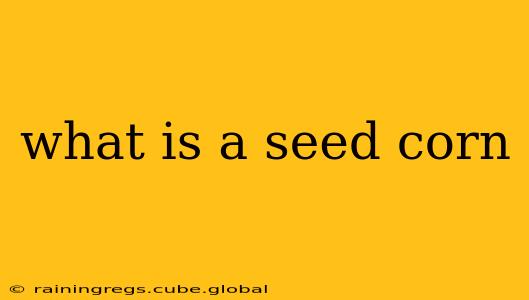Seed corn, simply put, is corn specifically grown and processed for planting, rather than consumption. It's the foundation of the next corn crop, carefully selected and treated to ensure high yields and desirable traits in the subsequent generation. Understanding what makes seed corn unique is crucial for anyone involved in agriculture, from large-scale farming operations to home gardeners. This guide will delve into the specifics of seed corn, answering common questions and exploring its importance in food production.
What are the characteristics of good seed corn?
Good seed corn possesses several key characteristics that contribute to successful crop growth. These include: high germination rates, meaning a large percentage of the seeds will sprout; disease resistance, protecting the plants from various fungal, bacterial, and viral infections; uniformity, ensuring consistent plant height, maturity, and ear development across the field; vigor, leading to strong, healthy seedlings that can withstand environmental stress; and yield potential, indicating the expected harvest volume per acre. Seed companies rigorously test their corn varieties to ensure these characteristics are met.
What is the difference between seed corn and regular corn?
The primary difference lies in the intended use. Regular corn, also known as field corn, is grown for animal feed, ethanol production, and human consumption (as sweetcorn or cornmeal). While some field corn might germinate if planted, it hasn't undergone the same rigorous selection and processing as seed corn. Seed corn is specifically bred and treated to optimize germination, disease resistance, and yield. It is often more expensive than field corn due to the intensive processes involved in its production.
How is seed corn produced and processed?
Producing seed corn involves careful planning and execution. Firstly, elite parent lines are selected and cross-pollinated to create hybrids with desirable traits. These hybrids then undergo rigorous testing to evaluate their performance in various environments. Once a superior hybrid is identified, it's grown in isolated fields to prevent cross-pollination with other corn varieties. After harvest, the seeds are meticulously cleaned, graded, treated with fungicides and insecticides (to protect against early seedling diseases and pests), and coated to enhance germination and seedling establishment. Finally, they're packaged and distributed to farmers.
What are the different types of seed corn?
Various types of seed corn exist, catering to diverse agricultural needs and environmental conditions. These can be categorized by maturity group (determining planting time and harvest window), plant height, kernel type (dent, flint, sweet), and insect/disease resistance. Farmers select specific varieties based on their local climate, soil conditions, and desired harvest characteristics. For example, drought-tolerant varieties are preferable in arid regions, while varieties with resistance to specific pests are crucial in areas susceptible to pest infestations.
Where can I buy seed corn?
Seed corn is typically purchased from agricultural supply stores, seed dealers, or directly from seed companies. Choosing a reputable supplier is critical, ensuring the seeds are of high quality and appropriate for your specific needs. It's important to select seed corn varieties suited to your local climate and soil type for optimal yield.
How do I store seed corn properly?
Proper storage is essential for maintaining seed viability. Seed corn should be stored in a cool, dry, well-ventilated area, away from direct sunlight and moisture. Maintaining a consistent temperature and humidity is crucial for preventing deterioration and maintaining high germination rates. Many seed companies provide detailed storage recommendations on their packaging.
By understanding the nuances of seed corn production, processing, and storage, farmers can significantly improve their crop yields and contribute to a stable food supply. The careful selection and treatment of seed corn form the bedrock of successful corn cultivation, influencing the quality and quantity of the harvest.
